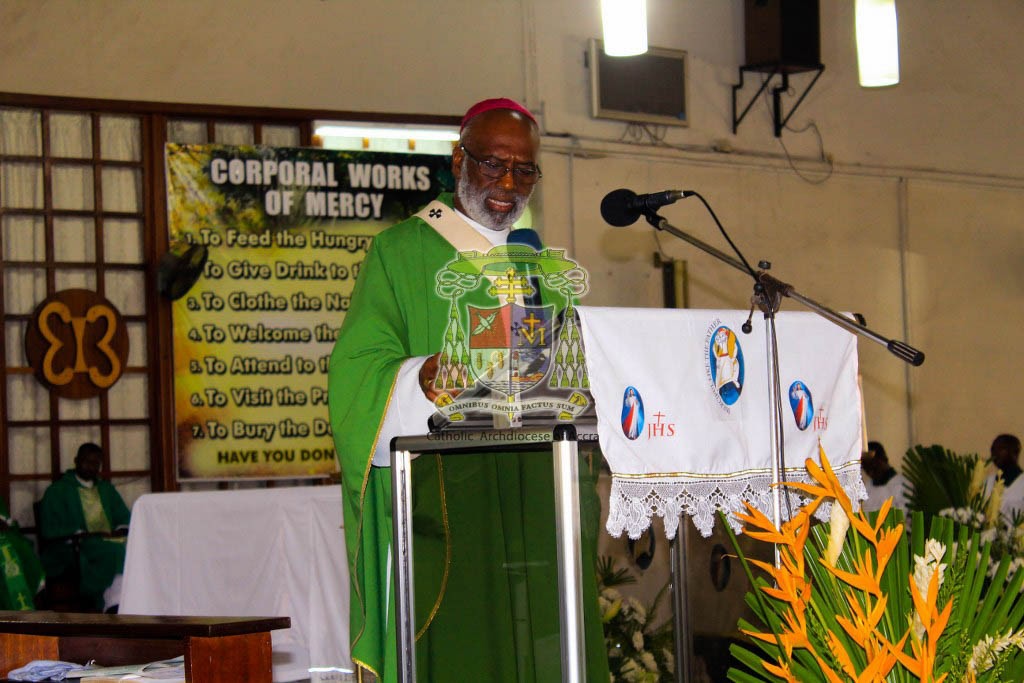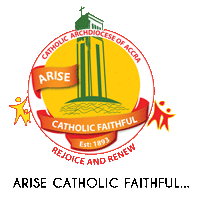
HOLY MASS FOR THE CLOSING CELEBRATION OF THE EXTRAORDINARY JUBILEE YEAR OF MERCY AT THE HOLY SPIRIT CATHEDRAL, ADABRAKA-ACCRA ON SUNDAY, NOVEMBER 13, 2016.
- Sermon: “Be merciful like the Father! Like the Father, be merciful!” My dear brothers and sisters in Christ, before I go on to share some reflection with you on the Closing of the Jubilee Year of Mercy, let us look at the readings of today, the 33rd Sunday of Ordinary Time. They are taken from the
- Prophet Malachi 3:19-20,
- from St. Paul’s Second Letter to the Thessalonians 3:7-12
- and from St. Luke’s Gospel 21:5-9.
What are we to learn from them for our lives? Since today is the last Sunday before the Solemnity of Our Lord Jesus Christ, King of the Universe, the readings focus on the end times. God is going to come one day to judge all his children. The Creed says: “He shall come to judge the living and the dead!”
1.1: The lesson from the Prophet Malachi is that at the judgment, “…the evil doers will burn like stubble…but for you who fear my name, the sun of righteousness will shine out in its rays…” Let us therefore be warned, and let each one of us live a life of righteousness pleasing and acceptable to God.
1.2: In our Second Reading, St. Paul in his Second Letter to the Thessalonians, cautions the Christians against idleness, laziness and interference in other people’s business; St. Paul advises,“…let no one be idle in Christ Jesus…we order and call on all to go on quietly working and earning the food they eat…” Yes, the Christian is called by God the Creator, and endowed with talents to work and to improve upon God’s creation. Anyone who is idle and does no work, should not be allowed to eat, or to enjoy the fruits of other people’s hard work. This is the injunction of St. Paul to Christians.
1.3: In St. Luke’s Gospel, our Lord Jesus Christ warns his followers that they will be persecuted for his sake saying: “…they (your persecutors) will hand you over to the synagogues and to imprisonment, and bring you before kings and governors because of my name – and that will be your opportunity to bear witness…Your endurance (however) will win you your lives!” In other words, if as a Christian, you are persecuted for doing what Christ asks of you, then, you should persevere in doing the right thing always, for that is how you will earn eternal life.
1.4: So my dear brothers and sisters in Christ Jesus, the message of today’s readings is that the Christian must never give up doing the right thing, nor allow himself/herself to be dragged into evil doing or idleness. He/she must persevere like Christ, who suffered even unto the cross. Surely there will be a crown for those who persevere in their faith in Christ and show it in their deeds. In short, No cross! No crown!
1.5: Now let me turn to the closing of this Extraordinary Jubilee Year of Mercy. My dearly beloved People of God, by the powers vested in him as the Vicar of Christ on earth, the Holy Father, Pope Francis proclaimed the time from December 08, 2015, the Solemnity of the Immaculate Conception of Mary, Mother of Christ, up until November 20, 2016, the Solemnity of Our Lord Jesus Christ, King of the Universe, as an EXTRAORDINARY JUBILEE OF MERCY.
In his official document inaugurating the Jubilee of Mercy, known as the Bull of Indiction titled the Face of Mercy (MisericordiaeVultus, in Latin), Pope Francis wrote: “…I have proclaimed an Extraordinary Jubilee of Mercy as a special time for the Church, a time when the witness of believers might grow stronger and more effective…” (MV 3). According to our Holy Father, it was to be “an extraordinary time of grace…” and he expressed his personal wish for the Jubilee Year of Mercy, thus: “How much I desire that the year…will be steeped in mercy, so that we can go out to every man and woman, bringing the goodness and tenderness of God! May the balm of mercy reach everyone, both believers and those far away, as a sign that the Kingdom of God is already present in our midst!” (MV 5).
In the document The Face of Mercy, Pope Francis taught us that in Jesus, God has made his mercy visible in a definitive way, and, therefore “whoever sees Jesus, sees God the Father”. “Jesus of Nazareth, by his words, his actions, and his entire person reveals the mercy of God” (MV 1). The Holy Father went on to give us the “roadmap” of how to celebrate this year of mercy in order to obtain the special graces, namely the Indulgences of the Extraordinary Year of Mercy (see MV 22). This roadmap, Pope Francis laid out in three successive spiritual steps or movements of conversion, namely:
- “We are to gaze even more attentively on mercy so that we may become a more effective sign of the Father’s action in our lives…” (MV 3);
- Like the prodigal son in the Gospel of St. Luke 15:11-32, we are then to “arise and return to my (the) Father and say, ‘Father, I have sinned against heaven and against you, I do not deserve to be called your son!” (Lk 15:18ff). In other words, we are to let the encounter with the mercy of God in Jesus, the Face of the Father’s Mercy, convict us and convert us to ask for pardon for our sins, for “God never tires of forgiving sins” (MV 22);
- We are to become “missionaries of God’s mercy and ambassadors of Christ’s reconciliation” in the world to all.
These three steps of the spiritual exercise of God’s mercy, my dearly beloved in Christ, I know you have all been trying to accomplish with the help of the different spiritual activities and events offered during the Year of Mercy that is today drawing to a close. Some of these activities were:
- the Opening of the Holy Door of Mercy in the Cathedrals and at the five Marian grottoes and other pilgrimage sites of the Archdiocese,
- the pilgrimages, home and abroad, to the Holy Doors and Marian and other Sanctuaries,
- the Lenten fasting and stations of the Cross, and Penitential Services,
- the May and October rosary devotions,
- and the incessant encouragement to live out the Seven Corporal and the Seven Spiritual Works of Mercy, etc., individually and in our pious associations, etc.
Please, permit me to advise that even with the closing of the extraordinary Jubilee Year of Mercy today, we are not to stop performing these spiritual exercises, pilgrimages and works of mercy, but rather to intensify them in a bid to fulfill the roadmap to conversion until we grow to the full stature of Christ, as St. Paul puts it in his Letter to the Ephesians 4:13. According to the Holy Father, the “end result of this Holy Year of Mercy is that: “In our parishes, communities, associations and movements…wherever there are Christians, everyone should find an oasis of mercy” (MV 12).
My dear brothers and sisters in Christ Jesus, the task of conversion is never fully accomplished in one’s lifetime; it is a life-long enterprise that only God can complete in us by his unfathomable grace and ceaseless out-pouring of mercy and love (see MV 22).
1.6: The long but grace-filled journey of conversion: Now, to conclude, let me cite three simple and well-known examples from the Holy Scriptures for you, which I believe outline this three-step roadmap which should help us keep on persevering on our journey of conversion long after the closing of the Jubilee year of Mercy:
- My first example is that of Simon Peter at the miraculous catch of fish on the Sea of Galilee in Luke 5:1-11;
- The second is the experience of all the apostles on the first day of the Resurrection in John 20:19-23;
- My last one is the experience of Saul in his conversion to Paul in Acts 9:1-22.
Interesting enough, in all three examples and experiences, first, there was the encounter with Jesus the Face of the Father’s Mercy; this was followed by conviction, confession of sins and personal conversion; then the call to mission, to become an ambassador of God’s mercy and love. Yes, Simon Peter encountered the mercy of the Father in Jesus Christ as Lord and Master, the Holy One of God; he confessed his unworthiness saying “Depart from me Lord, for I am a sinful man”. Jesus assured him of God’s mercy and forgiveness and told him: “Do not be afraid, for from now onwards, you will be catching men!”
We see the same movement in the apostles who encounter the Risen Lord Jesus on the evening of the Resurrection. They also see their unworthiness, sins of betrayal and desertion of their friend; and they are forgiven by the Lord Jesus who then sends them to be his instruments of reconciliation and forgiveness: “As the Father sent me, so do I send you…Receive the Holy Spirit! If you forgive the sins of any, they are forgiven them…”
Finally, how about the experience of Saul on the way to Damascus? He also encountered Jesus the Lord whom he was unknowingly persecuting, is convicted of his sins and forgiven, and he is chosen to become “a vessel of mine to bear my name before Gentiles, kings and the children of Israel”, the Holy Bible tells us I Acts. 9:15-16.
1.7: My dearly beloved People of God; “BE MERCIFUL! LIKE THE FATHER!” This has been the watchword of this extraordinary Jubilee of Mercy proclaimed by the Holy Father. This is and will remain, not just for the Jubilee Year, but for the whole of our lives, because “We need constantly to contemplate the mystery of mercy. It is the wellspring of joy, serenity, and peace. Our salvation depends on it. Mercy…reveals the Most Holy Trinity…Mercy (is) the fundamental law that dwells in the heart of every person who looks sincerely into the eyes of his brothers and sisters on the path of life. Mercy (is) the bridge that connects God and man, opening our hearts to the hope of being loved forever despite our sinfulness” (MV 2).
It is my prayer that having been favored to live in this Jubilee Year of Mercy, this extraordinary time of grace,
- we shall never be tired of gazing more and more deeply, and contemplating the Face of the Father’s Mercy in Jesus Christ;
- we constantly and persistently steep ourselves in his mercy through the Word and Sacraments of Jesus Christ in the Church; and
- we shall strive to become ever new and renewed “ambassadors of God’s mercy and reconciliation”.
In an interview with the Holy Father on why he proclaimed the extraordinary Jubilee of Mercy, his reply, inter alia was: the world is very wounded, and needs healing. Only Mercy can heal it.
Yes, our country too, stands today very much in need of God’s healing and balm of Mercy. Let us become daily more and more, even after the Jubilee of Mercy, the sacraments of God’s mercy in our homes and families, in our places of work and life, in our towns and cities, in our country Ghana and everywhere we find ourselves. May our parishes and Church communities, our associations and societies grow daily to become truly “oases of God’s mercy” (see MV 12). “For the name of God is Mercy”. And his mercy endures forever! (see Ps 136). Amen.
- My dearly beloved in Christ Jesus, at the end of this Eucharistic Celebration, I will have the singular honour and privilege, as the Metropolitan Archbishop of Accra, to invoke/impart upon all of you here present, and throughout the Archdiocese of Accra, the grace and gift of the Plenary Indulgence that the Holy Father, Pope Francis, by the power of the keys given to St. Peter the Vicar of Christ, and vested in him as the Supreme Pontiff of the Holy Catholic Church, has made available to all who have duly celebrated this Extraordinary Jubilee Year of Mercy.
Delivered by Most Rev. Charles G. PALMER-BUCKLE,
Metropolitan Archbishop of Accra
& Vice President of GCBC.

